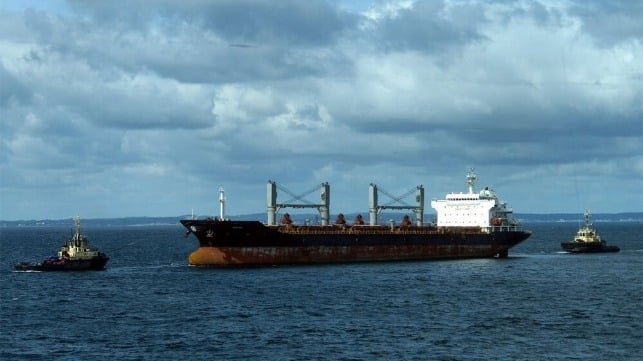Panama-Flagged Bulker Meshka Successfully Refloated After Grounding in Øresund
A Panama-flagged bulker, Meshka (35,829 dwt), which went aground a week ago in the Øresund between Sweden and Denmark was successfully refloated during the day on Saturday, June 7. The Swedish Coast Guard reports the operation proceeded without problem or pollution, and the ship was safely moved to port for further inspections.
The salvage operation, conducted by a professional salvage company hired by the vessel’s owners, began at 0300 on Saturday morning by emptying the ballast tanks. Two tugboats were connected to the stern and bow of Meshka to assist in the refloating process. By 0830, the ship was floating freely and was able to continue an eight-hour journey to Landskrona, Sweden under its own power. Pilots from the Swedish Maritime Administration and Coast Guard officials were present on board during the salvage operation.
On board Meshka, there are approximately 938,000 liters of oil in fuel and lubricating oil tanks. The Coast Guard closely monitored the refloating process to address any potential oil leaks, and additional environmental rescue resources were on standby in Landskrona and Malmö.
Meshka grounded on May 31 while it was southbound in the Øresund en route from Tarragona, Spain to the Russian port of Vysotsk near the Finnish border. An investigation is underway to determine why the vessel deviated from the shipping lane and ran aground on the soft sandy bottom, especially considering it was traveling with ballast only.
Concerns in the Shipping Industry
The incident involving Meshka is the second grounding by a bulker in the same area within a week, raising concerns in the shipping industry. Just days prior, a Turkish-owned bulker also went aground in the vicinity. These incidents highlight the importance of strict adherence to maritime navigation protocols and the dangers of distracted or fatigued crew members contributing to maritime casualties.
In recent years, there have been several incidents of crew negligence leading to groundings and fatal accidents. The importance of good seamanship, adherence to navigation guidelines, and maintaining proper lookout procedures cannot be overstated in ensuring maritime safety.
Addressing Crew Accountability
The Swedish Coast Guard reported that sobriety checks conducted on Meshka crew members revealed no suspicions of drunkenness. However, one crew member has been charged with negligence in maritime traffic, prompting a preliminary investigation into the circumstances surrounding the grounding.
Similar incidents in the past have highlighted the need for enhanced crew accountability and vigilance to prevent maritime accidents. Fatigue, stress, and distractions on board ships can significantly impact crew performance and decision-making, underscoring the importance of proper training and adherence to safety protocols.
Conclusion
Swedish authorities expressed satisfaction with the successful refloating of both Meshka and the previously grounded bulker without significant pollution incidents. These incidents serve as sobering reminders of the importance of maintaining high standards of seamanship, crew accountability, and adherence to maritime regulations to ensure safe navigation and prevent environmental hazards.

